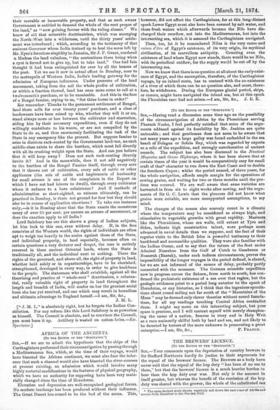[TO THE EDITOR OF THE " SPECTATOR.1
SIR,—Having read a discussion some time ago on the possibility of the circumnavigation of Africa by the Phoenicians serving Pharaoh Necho, I feel perfectly satisfied that some of the argu- ments adduced against its feasibility by Mr. Jenkins are quite untenable ; and that gentleman does not seem to be aware that not many years ago a large galley was found embedded in the sea beach of Delagoa or Sofala Bay, which was regarded by experts as a relic of the expedition, and strongly corroborative of ancient records. The subject has also been discussed in the Nautical Magazine and Ocean Highways, where it has been shown that at certain times of the year it would be comparatively easy for small craft of that character to run down the East Coast and to double the Southern Capes ; whilst the period named, of three years, for the whole navigation, affords ample margin for the operations of sowing grains, and waiting for two or three months until the pro- duce was secured. We are well aware that some varieties are harvested in from six to eight weeks after sowing, and the argu- ments of Sir G. C. Lewis that the pioneers did not know what grains were suitable, are mere unsupported assumptions, to my mind.
The changes of the season also scarcely count in a climate where the temperature may be considered as always high, and stimulative to vegetable growths with great rapidity. Mariners like the Phoenicians, whose sea walls, still extant at Tyre and Sidon, indicate high constructive talent, were perhaps more advanced in naval details than we suppose, and the fact of their regular visits to the British Isles is powerful testimony to their hardihood and seamanlike qualities. They were also familiar with the Indian Ocean, and to say that the return of the fleet under Admiral Nearchus from the Gulf of Cutch to Gambroon or Bussorah (Basrah), under such tedious circumstances, proves the impossibility of the longer voyages in the period defined, is absurd, for we are not informed of the causes of delay, probably partly connected with the monsoon. The German scientific expedition now in progress across the Sahara, from north to south, has con- firmed the prehistoric existence of a sea over that region, but the geologic evidences point to a period long anterior to the epoch of Herodotus, or any historian, so I think that the ingenious specula- tions about round sailing not far south of the " Mountains of the Moon " may be deemed only clever theories without sound founda- tions, for all my readings touching Central Africa contradict them. I might say more on this interesting subject, but your space is precious, and I will content myself with merely champion- ing the cause of a nation, famous in story and in Holy Writ as a race eminently skilful both by land and sea, and not likely to be daunted by terrors of the mere unknown in prosecuting a great






































 Previous page
Previous page